Can we eat Mushrooms & seaweed?
Turn your phone sideways for the best experience.

CAN WE EAT MUSHROOMS & SEAWEED?
By Pastor Micah B Anthony SR
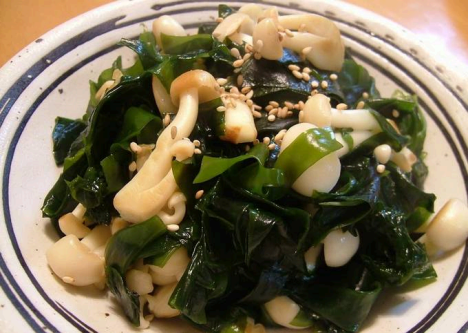
For whatever it is worth, our position at the Congregation of Yahshua is yes, we can eat seaweed.
In some ways, our response to seaweed would be the same as eating Mushrooms for Food?”
At first it appears to be a rather odd question, but the question is understandable. What is a mushroom?
Wikipedia: A mushroom (or toadstool) is the fleshy, spore-bearing fruiting body of a fungus, typically produced above ground on soil or on its food source.
(http://en.wikipedia.org/wiki/Mushroom)
In modern times, it is typical to teach that mushrooms do not contain seeds, but instead they contain spores. It’s interesting that this distinction is not as strongly emphasized about seaweed whose spores are also called Seaweed seeds…
(https://shuncy.com/article/grow-seaweed)
“Seaweed seeds, also known as spores or propagules, are required to start the cultivation process.”

Seaweed Cultivation 101: A Guide To Growing Sea Vegetables Last updated Jun 27, 2023
Spore: The chief difference between spores and seeds as dispersal units is that spores are unicellular, while seeds contain within them a multicellular gametophyte that produces a developing embryo, the multicellular sporophyte of the next generation. Spores germinate to give rise to haploid gametophytes (Gam-EET'-oh-fytes), while seeds germinate to give rise to diploid sporophytes.
The term spore derives from the ancient Greek word spora, meaning "seed, sowing," related to sporos, "sowing," and speirein, "to sow." (http://en.wikipedia.org/wiki/Spore)
Our Creator specifically stated that he gave us plants that yield seed as food for us.
Genesis 1:29 And Elohim said, “See, I have given you every herb that yields seed which is on the face of all the earth, and every tree whose fruit yields seed; to you it shall be for food.
At this point, the contention about mushrooms is understandable.
There are two points to consider.
The first point is that if mushrooms were not considered to be food, it could be still said that they are not forbidden. Leviticus 11 details the things that we are forbidden to eat.
It might sound like a fine line, but we must remember that we are not to add to the Word of Yahweh or subtract from it.
It would however, mean that eating mushrooms might not be ideal, but not really cross into the territory of being considered sin.

But yeast produces spores as well, and is in the same family type as mushrooms.
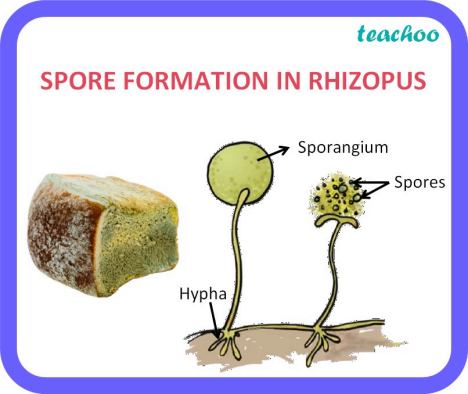
And we all know that leavened bread contains yeast, and was a major staple food in the Bible, and still is today.
If yeast and mushrooms are in the same food family, and the Bible permits yeast, why could we not eat mushrooms?
So what are we missing? Perhaps mushrooms do contain seeds and perhaps mushrooms are plants.
It is about a definition of terms. We should all agree that we should use the Bible to define our words when we are using such words to explain theological doctrine and understanding.
There is no such thing as “spores” in Scripture. The word “spores” is a man-made term in an attempt to distinguish between seeds.
That is not bad, because modern science defines the terms it is using.
However, it is bad if we take those definitions and apply them in interpreting Scripture, because Scripture does not distinguish seed and spores, or plants and fungus, in the same way as we often do today.
The word seed in Scripture is used for people and plants. At the heart of the word, it denotes the biological vehicle utilized in the passing on of DNA, the instructions for life.
That is the basic essence and usage of the word.
Spiritually speaking, a seed is the Word of Elohim. What is the Word of Elohim? The Word of Elohim is the instructions for life...it is our Spiritual DNA if you will. You see then how the physical teaches the spiritual understanding and how the spiritual teaches the physical understanding.
For this reason, this is how Yahshua defined a spiritual seed.
Luke 8:11 Now the parable is this: The seed is the Word of Elohim.
Peter used the same definition:
1 Peter 1:23 since you have been born again, not of perishable seed but of imperishable, through the living and abiding word of Elohim;
In this Biblical biological or spiritual definition, a spore fits the definition of a Biblical seed.
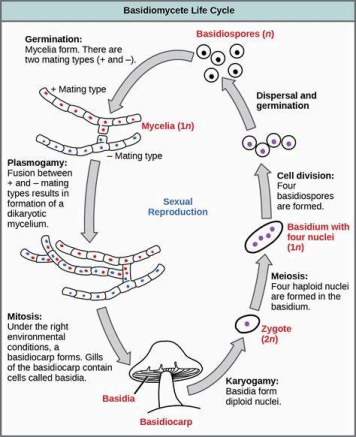
A spore contains the instructions for life. It contains DNA. It is used to pass on genetic information, the information for life, on to offspring.
Now you understand why you are considered a child of Elohim. His Spiritual DNA or seed is in you...the Torah.
Also, the Bible does not distinguish between plants and fungus. Men distinguish between plants and fungus. The Encyclopedia Britannica states…
Mid-1900s
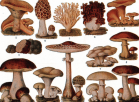
For centuries, fungi were included in the plant kingdom. The taxonomic kingdom Fungi was not established until the mid-1900s to distinguish them from plants—based on a few key differences.
How Are Fungi Different From Plants? | Britannica
www.britannica.com/video/253820/fungi-plant-comparison-mushroom-mushroo
Thus, a mushroom is indeed a plant that yields seed...at least in a Biblical sense. It is man that has chosen a more narrow definition of the nature and functions of a mushroom that would Biblically exclude it as what was intended as food.
So the question is this.
Do we use men’s definitions to determine Scriptural understanding, or do we use Biblical definitions to determine Scriptural understanding. How one answers that question will determine whether or not one would describe mushrooms as food.
As a contrary point, it does appear that Yahweh Elohim focuses on the plants being green. We would have to note that there are examples of green mushrooms:

Hygrocybe psittacina,

Leotia viscosa,
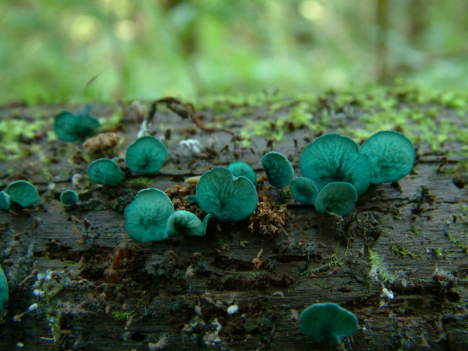
Chlorociboria aeruginosa,
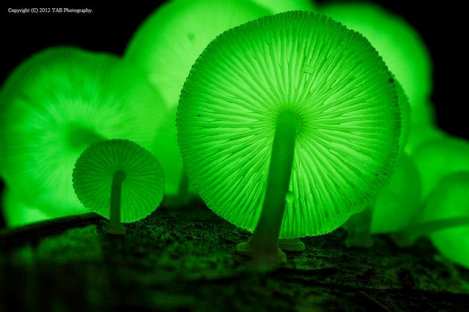
Mycena interrupta,
If you look at this list, this would be an example of some of those.
We read this in the following verse:
Genesis 1:30 And to every beast of the earth and to every bird of the heavens and to everything that creeps on the earth, everything that has the breath of life, I have given every green plant for food.”
Whatever the answer might be, we certainly do not see any commandment to not eat mushrooms; to say that we cannot eat mushrooms might actually be adding to the Torah (Deuteronomy 4:2).
However, we also may not see any commandments that encourage it.
In addition, as we already mentioned, eating yeast is certainly acceptable according to examples found in the TANAKH and the Brit Hadasha, yet yeast is not green. Again, yeast and mushrooms are of the same family type. If we were to teach that the Torah forbids the eating of mushrooms, we would have to, likewise, teach that the Torah forbids the eating of yeast. Of
course, we can’t do that, because the Bible clearly offers us any number of examples to show us that it is acceptable to eat yeast.
What is interesting is that some mushrooms are so toxic that they can cause immediate death through organ failure, whereas other mushrooms are perhaps the most potent antioxidant, anti-aging and anticancer types of food that exists on Earth.
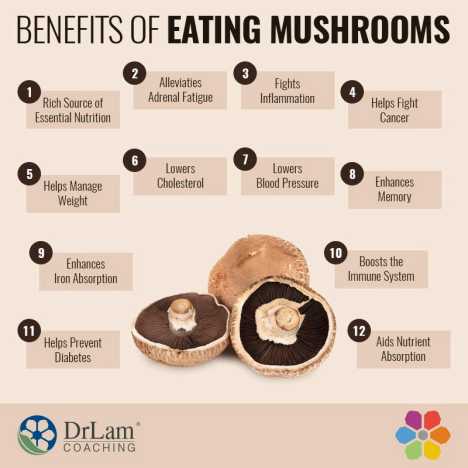
However, the same can also be said of other plants that are green and produce seeds, some are toxic and some are not. So highlighting the fact that some mushrooms are toxic does not really help us on this matter.
As we have covered, there are indeed two points of criticism to consider regarding whether mushrooms are food.
One is the seed argument and the other is the green argument. We have addressed both in great detail.
However, the real mistake is thinking that either of those points of criticism matter, which is the real point we try to make.
What do we mean?
We only mention the matter of spores vs seeds to demonstrate that mushrooms do indeed have seeds, in a Biblical sense. This is not said to prove that mushrooms are food, but to prove that we cannot use the seed matter as evidence against mushrooms being food.
Then there is the issue of green, to which we brought up that some mushrooms are green. This of course would mean that even some mushrooms have seeds (spores) and are green. This means that at minimum, some mushrooms are Biblically defined as food.
Now, all this is said in the context of what defines “food.” We do note that even if mushrooms are not food, that it does not matter. There is no negative commandment attached to eating anything that is not considered food, with the exception of unclean animals. This means that the whole debate is nearly pointless.
This is why we also bring up the matter of yeast. Yeast can be added to bread to make it rise, but yeast is not considered a Biblical food, but it is used Biblically in our food.
The same goes with salt. Salt is not Biblically defined as food.

Yet we mine salt. However, salt is indeed eaten in the Bible.
Worst case scenario is that some mushrooms are not food (they’re not green) and fall into the category of things like salt, water, yeast, probiotics, etc.
The mistake is thinking that it matters that some mushrooms may not be food. What matters in the Bible is whether or not something is unclean as anything unclean is not to be eaten. There is nothing in the Bible that says that mushrooms are unclean.
In the end, while we hope we have given you much to consider, we leave it to you to make up your own mind. We would simply urge all to not add to the Torah by stating that eating mushrooms is a sin.
Summary
In short, the prohibitions on what is and is not food are found in Leviticus 11. However, Leviticus 11 focuses on animals and Biblically seaweed and mushrooms are plants. Some have determined that some plants are food and some are not based on Genesis 1:29 in which we are told that all seed bearing plants are food for us. The key is discerning the difference between what science calls a seed, and what the Bible defines as a seed. If we use the modern definition of seed, then mushroom and seaweed cannot be food.
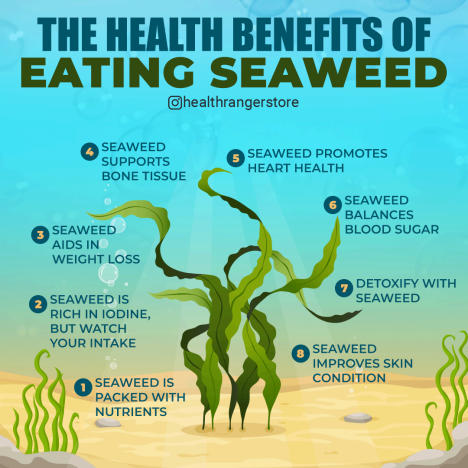
If we use the Biblical definition of seed, then mushroom and seaweed is food. In that difference, one realizes that it is perfectly ok to eat mushrooms and seaweed.
By Pastor Micah B Anthony SR
For whatever it is worth, our position at the Congregation of Yahshua is yes, we can eat seaweed.
In some ways, our response to seaweed would be the same as eating Mushrooms for Food?”
At first it appears to be a rather odd question, but the question is understandable. What is a mushroom?
Wikipedia: A mushroom (or toadstool) is the fleshy, spore-bearing fruiting body of a fungus, typically produced above ground on soil or on its food source.
(http://en.wikipedia.org/wiki/Mushroom)
In modern times, it is typical to teach that mushrooms do not contain seeds, but instead they contain spores. It’s interesting that this distinction is not as strongly emphasized about seaweed whose spores are also called Seaweed seeds…
(https://shuncy.com/article/grow-seaweed)
“Seaweed seeds, also known as spores or propagules, are required to start the cultivation process.”
Seaweed Cultivation 101: A Guide To Growing Sea Vegetables Last updated Jun 27, 2023
Spore: The chief difference between spores and seeds as dispersal units is that spores are unicellular, while seeds contain within them a multicellular gametophyte that produces a developing embryo, the multicellular sporophyte of the next generation. Spores germinate to give rise to haploid gametophytes (Gam-EET'-oh-fytes), while seeds germinate to give rise to diploid sporophytes.
The term spore derives from the ancient Greek word spora, meaning "seed, sowing," related to sporos, "sowing," and speirein, "to sow." (http://en.wikipedia.org/wiki/Spore)
Our Creator specifically stated that he gave us plants that yield seed as food for us.
Genesis 1:29 And Elohim said, “See, I have given you every herb that yields seed which is on the face of all the earth, and every tree whose fruit yields seed; to you it shall be for food.
At this point, the contention about mushrooms is understandable.
There are two points to consider.
The first point is that if mushrooms were not considered to be food, it could be still said that they are not forbidden. Leviticus 11 details the things that we are forbidden to eat.
It might sound like a fine line, but we must remember that we are not to add to the Word of Yahweh or subtract from it.
It would however, mean that eating mushrooms might not be ideal, but not really cross into the territory of being considered sin.
But yeast produces spores as well, and is in the same family type as mushrooms.
And we all know that leavened bread contains yeast, and was a major staple food in the Bible, and still is today.
If yeast and mushrooms are in the same food family, and the Bible permits yeast, why could we not eat mushrooms?
So what are we missing? Perhaps mushrooms do contain seeds and perhaps mushrooms are plants.
It is about a definition of terms. We should all agree that we should use the Bible to define our words when we are using such words to explain theological doctrine and understanding.
There is no such thing as “spores” in Scripture. The word “spores” is a man-made term in an attempt to distinguish between seeds.
That is not bad, because modern science defines the terms it is using.
However, it is bad if we take those definitions and apply them in interpreting Scripture, because Scripture does not distinguish seed and spores, or plants and fungus, in the same way as we often do today.
The word seed in Scripture is used for people and plants. At the heart of the word, it denotes the biological vehicle utilized in the passing on of DNA, the instructions for life.
That is the basic essence and usage of the word.
Spiritually speaking, a seed is the Word of Elohim. What is the Word of Elohim? The Word of Elohim is the instructions for life...it is our Spiritual DNA if you will. You see then how the physical teaches the spiritual understanding and how the spiritual teaches the physical understanding.
For this reason, this is how Yahshua defined a spiritual seed.
Luke 8:11 Now the parable is this: The seed is the Word of Elohim.
Peter used the same definition:
1 Peter 1:23 since you have been born again, not of perishable seed but of imperishable, through the living and abiding word of Elohim;
In this Biblical biological or spiritual definition, a spore fits the definition of a Biblical seed.
A spore contains the instructions for life. It contains DNA. It is used to pass on genetic information, the information for life, on to offspring.
Now you understand why you are considered a child of Elohim. His Spiritual DNA or seed is in you...the Torah.
Also, the Bible does not distinguish between plants and fungus. Men distinguish between plants and fungus. The Encyclopedia Britannica states…
Mid-1900s
For centuries, fungi were included in the plant kingdom. The taxonomic kingdom Fungi was not established until the mid-1900s to distinguish them from plants—based on a few key differences.
How Are Fungi Different From Plants? | Britannica
www.britannica.com/video/253820/fungi-plant-comparison-mushroom-mushroo
Thus, a mushroom is indeed a plant that yields seed...at least in a Biblical sense. It is man that has chosen a more narrow definition of the nature and functions of a mushroom that would Biblically exclude it as what was intended as food.
So the question is this.
Do we use men’s definitions to determine Scriptural understanding, or do we use Biblical definitions to determine Scriptural understanding. How one answers that question will determine whether or not one would describe mushrooms as food.
As a contrary point, it does appear that Yahweh Elohim focuses on the plants being green. We would have to note that there are examples of green mushrooms:
Hygrocybe psittacina,
Leotia viscosa,
Chlorociboria aeruginosa,
Mycena interrupta,
If you look at this list, this would be an example of some of those.
We read this in the following verse:
Genesis 1:30 And to every beast of the earth and to every bird of the heavens and to everything that creeps on the earth, everything that has the breath of life, I have given every green plant for food.”
Whatever the answer might be, we certainly do not see any commandment to not eat mushrooms; to say that we cannot eat mushrooms might actually be adding to the Torah (Deuteronomy 4:2).
However, we also may not see any commandments that encourage it.
In addition, as we already mentioned, eating yeast is certainly acceptable according to examples found in the TANAKH and the Brit Hadasha, yet yeast is not green. Again, yeast and mushrooms are of the same family type. If we were to teach that the Torah forbids the eating of mushrooms, we would have to, likewise, teach that the Torah forbids the eating of yeast. Of
course, we can’t do that, because the Bible clearly offers us any number of examples to show us that it is acceptable to eat yeast.
What is interesting is that some mushrooms are so toxic that they can cause immediate death through organ failure, whereas other mushrooms are perhaps the most potent antioxidant, anti-aging and anticancer types of food that exists on Earth.
However, the same can also be said of other plants that are green and produce seeds, some are toxic and some are not. So highlighting the fact that some mushrooms are toxic does not really help us on this matter.
As we have covered, there are indeed two points of criticism to consider regarding whether mushrooms are food.
One is the seed argument and the other is the green argument. We have addressed both in great detail.
However, the real mistake is thinking that either of those points of criticism matter, which is the real point we try to make.
What do we mean?
We only mention the matter of spores vs seeds to demonstrate that mushrooms do indeed have seeds, in a Biblical sense. This is not said to prove that mushrooms are food, but to prove that we cannot use the seed matter as evidence against mushrooms being food.
Then there is the issue of green, to which we brought up that some mushrooms are green. This of course would mean that even some mushrooms have seeds (spores) and are green. This means that at minimum, some mushrooms are Biblically defined as food.
Now, all this is said in the context of what defines “food.” We do note that even if mushrooms are not food, that it does not matter. There is no negative commandment attached to eating anything that is not considered food, with the exception of unclean animals. This means that the whole debate is nearly pointless.
This is why we also bring up the matter of yeast. Yeast can be added to bread to make it rise, but yeast is not considered a Biblical food, but it is used Biblically in our food.
The same goes with salt. Salt is not Biblically defined as food.
Yet we mine salt. However, salt is indeed eaten in the Bible.
Worst case scenario is that some mushrooms are not food (they’re not green) and fall into the category of things like salt, water, yeast, probiotics, etc.
The mistake is thinking that it matters that some mushrooms may not be food. What matters in the Bible is whether or not something is unclean as anything unclean is not to be eaten. There is nothing in the Bible that says that mushrooms are unclean.
In the end, while we hope we have given you much to consider, we leave it to you to make up your own mind. We would simply urge all to not add to the Torah by stating that eating mushrooms is a sin.
Summary
In short, the prohibitions on what is and is not food are found in Leviticus 11. However, Leviticus 11 focuses on animals and Biblically seaweed and mushrooms are plants. Some have determined that some plants are food and some are not based on Genesis 1:29 in which we are told that all seed bearing plants are food for us. The key is discerning the difference between what science calls a seed, and what the Bible defines as a seed. If we use the modern definition of seed, then mushroom and seaweed cannot be food.
If we use the Biblical definition of seed, then mushroom and seaweed is food. In that difference, one realizes that it is perfectly ok to eat mushrooms and seaweed.